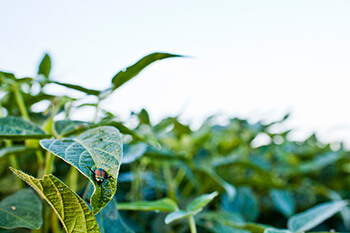Will Early-Season Rain Affect Insect Populations?
Jun 08, 2020

By Darrin Roberts, Agronomist for WinField United
As with any year, pest pressure is unpredictable, but there are three things to keep in mind when it comes to managing insects following cool springs and heavy early-season rain.
1. Slow insect development means later emergence in fields
Across much of the Corn Belt and most of the southern U.S., early spring conditions were cool and wet. That environment meant that insect development was delayed compared to a typical year, because the heat units that dictate their growth accumulated slower than average. In Iowa, corn rootworm larvae typically hatch around the first week of June. This year, we saw about a two-week delay in rootworm hatch, meaning that larvae most likely started feeding on roots in early July. Just because you haven’t seen feeding doesn’t mean there’s no pressure this year. More likely, it’s just that insects got a late start.
Some farmers may wonder if that delayed rootworm larvae hatch could mean less silk clipping from corn rootworm beetles this year. Unfortunately, I think the answer is no. Because corn planting across much of the Midwest was also delayed, there’s a good chance silk feeding could still be an issue around pollination time for some corn crops.
2. More rain doesn’t necessarily mean less insect pressure
I’ve been asked whether corn rootworm pressure might be reduced this year due to early-season moisture and flooded soils in many areas. I think the answer to that question really depends on when fields were flooded.
In many cases, heavy rain came very early in the season before the rootworm larvae hatched. As eggs, corn rootworm are protected fairly well from waterlogged soils, and slow development this season kept rootworms in that growth stage longer and likely gave extra protection against the early-season rain. Once eggs have hatched and are in the larva stage, they are more susceptible to drowning. If your fields saw continued heavy rain into early June, there’s a better chance that corn rootworm populations may have been reduced.
3. Variable crop growth makes diligent scouting critical
Across my area, there is wide variability in plant growth stage in corn and soybeans. Combined with delayed insect development, that variability makes it critical to stay on top of scouting efforts. In particular, soybean aphids could be a problem in late-planted beans this year since pressures tend to be higher in very early and late-planted crops. Late-planted cornfields are also vulnerable and could become a trap crop for corn rootworm beetles as they seek fresh food sources. Ag technology tools can help you document trouble areas for further evaluation.
Keep an eye on insect thresholds, know your crop’s growth stage and be prepared to apply an insecticide if pressures indicate a potential for yield loss. Contact your local Co-op or TFC regional agronomist for scouting support and product recommendations.
(Article originally published June 17, 2019)
As with any year, pest pressure is unpredictable, but there are three things to keep in mind when it comes to managing insects following cool springs and heavy early-season rain.
1. Slow insect development means later emergence in fields
Across much of the Corn Belt and most of the southern U.S., early spring conditions were cool and wet. That environment meant that insect development was delayed compared to a typical year, because the heat units that dictate their growth accumulated slower than average. In Iowa, corn rootworm larvae typically hatch around the first week of June. This year, we saw about a two-week delay in rootworm hatch, meaning that larvae most likely started feeding on roots in early July. Just because you haven’t seen feeding doesn’t mean there’s no pressure this year. More likely, it’s just that insects got a late start.
Some farmers may wonder if that delayed rootworm larvae hatch could mean less silk clipping from corn rootworm beetles this year. Unfortunately, I think the answer is no. Because corn planting across much of the Midwest was also delayed, there’s a good chance silk feeding could still be an issue around pollination time for some corn crops.
2. More rain doesn’t necessarily mean less insect pressure
I’ve been asked whether corn rootworm pressure might be reduced this year due to early-season moisture and flooded soils in many areas. I think the answer to that question really depends on when fields were flooded.
In many cases, heavy rain came very early in the season before the rootworm larvae hatched. As eggs, corn rootworm are protected fairly well from waterlogged soils, and slow development this season kept rootworms in that growth stage longer and likely gave extra protection against the early-season rain. Once eggs have hatched and are in the larva stage, they are more susceptible to drowning. If your fields saw continued heavy rain into early June, there’s a better chance that corn rootworm populations may have been reduced.
3. Variable crop growth makes diligent scouting critical
Across my area, there is wide variability in plant growth stage in corn and soybeans. Combined with delayed insect development, that variability makes it critical to stay on top of scouting efforts. In particular, soybean aphids could be a problem in late-planted beans this year since pressures tend to be higher in very early and late-planted crops. Late-planted cornfields are also vulnerable and could become a trap crop for corn rootworm beetles as they seek fresh food sources. Ag technology tools can help you document trouble areas for further evaluation.
Keep an eye on insect thresholds, know your crop’s growth stage and be prepared to apply an insecticide if pressures indicate a potential for yield loss. Contact your local Co-op or TFC regional agronomist for scouting support and product recommendations.
(Article originally published June 17, 2019)